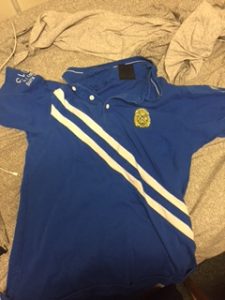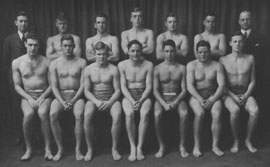Title: Freshman Sweep
General Information
Customary Lore: Ritual
English
USA
Informant Data:
Sarah Kolk is a member of the class of 2020 at Dartmouth. She is from Peterborough, New Hampshire, and lives in the McLaughlin housing cluster on campus. She is involved in the Ledyard Canoe Club and plays Dartmouth club lacrosse. The informant was interviewed on 11/2/16, in Baker Library at Dartmouth.
Contextual Data:
The informant experienced the Freshman Sweep during Friday night of Dartmouth homecoming, before the lighting of the bonfire. She heard about the tradition a few days ahead of time from her fellow classmates, and soon realized that it was a tradition that takes place every homecoming for the incoming freshmen class at Dartmouth.
Item:
Each year, the incoming class of freshmen at Dartmouth participate in what is known as the “Freshman Sweep.” Essentially, it is a giant parade through the streets of Hanover, which ends at the bonfire on the Dartmouth green, where the freshmen then run around the fire. The “Freshman Sweep” starts at the freshman dorms in the river cluster, and then works its way around campus, picking up more and more freshmen as they wait outside their dorms to join in. The sound from the bagpipers can be heard from far away, signaling to the awaiting freshmen that it is almost time to join in.
Transcript:
“I knew very little about the Freshman Sweep until I began to hear about it in the days leading up to homecoming from upperclassmen, and I was given formal information about the timing and location of when and where I was supposed to join by my UGA. I did participate, but since I am not super close to anyone on my floor I stuck with some friends from Wheeler and joined it as it passed there. We were at the end of the sweep and walked with it until we reached the bonfire. Overall the sweep was fun but I don’t consider it a huge part of my freshman homecoming experience because all my friends were dispersed throughout and we didn’t walk in it for very long.”
Informant’s Comments:
“Overall, I’d say that the Freshman Sweep was a cool tradition to be a part of, but it wasn’t the most memorable part of my first homecoming at Dartmouth. I’d say that when I look back on this experience after I graduate, I’ll remember running around the bonfire itself more than the Freshman Sweep.”
Collector’s Comments:
Looking back at Freshman Sweep as a current senior, I would agree with the informant when she says that it really wasn’t a huge part of my first homecoming at Dartmouth. Although it was fun to be a part of the first-year tradition, I think that running around the bonfire was something that I will remember for much longer.
Collector’s Name: John Mayberry
Tags/Keywords: Customary Lore, Ritual, Tradition, Freshman Sweep, Dartmouth Homecoming




